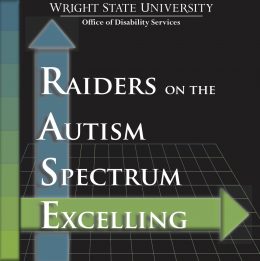 Wright State University is setting an example for other colleges through its coaching program for students on the autism spectrum, offered through the Office of Disability Services.
Wright State University is setting an example for other colleges through its coaching program for students on the autism spectrum, offered through the Office of Disability Services.
Raiders on the Autism Spectrum Excelling, or RASE, provides students with individualized coaching sessions throughout their first year of college. Participants build key competencies in the areas of social skill development, organization, study strategies, self-advocacy and resiliency.
Heather Rando, the associate director of the Office of Disability Services (ODS), developed the program, which typically serves a roster of 20-25 students per year. Most participants in the program are first-year students who come to Wright State directly from high school, but a few enroll after transferring to Wright State from another institution.
Prior to the program’s implementation in 2012, students with autism were eligible to receive academic accommodations through ODS; however, there was no program specifically designed to address the unique needs of students on the spectrum.
“Wright State was encountering challenges with retention for students with autism, but not necessarily because of academics,” Rando said. “Navigating the more complex environment of college (compared to high school) can be stressful for all students, and is often more so for students who have challenges in the areas of communication and social interaction.”
Since the founding of RASE, over 120 students have participated in the program.
The most important aspect of the RASE program is the student coaching. The program hinges on trained peer coaches, student employees of ODS who are juniors, seniors or graduate students and exemplary students. Coaches meet with RASE student for up to five hours a week to discuss courses, grades, organizational strategies and to engage in exercises to improve social skills.
“The primary goal of the coaching relationship is to help a student with autism to build clarity and structure into the less structured nature of the college environment, so that they have an understanding of the expectations associated with attending Wright State,” said Rando.
Coaches may also assist the student in unexpected ways. A coach could attend a faculty meeting with a student, attend a student organization meeting with the student, assist the student by accompanying them to ride the campus shuttle or go grocery shopping.
“Although geared for the student with autism, the coaching process is also beneficial for the coaches. Through the process of mentorship, by modeling behaviors and skill sets, the coach develops leadership skills as well as a more thorough mastery of key life competencies,” Rando said. “The connection between coach and student is pretty transformative.”
This method of coaching students has gained national interest due to the success seen at Wright State.
Ohio University, Rando said, piloted an autism support program last fall based on the RASE program. In addition, two universities in Massachusetts are researching whether the RASE model of coaching could support not only students on the autism spectrum, but also students with mental health disabilities.
Assistance is also available for students with autism as they begin their transition to internships and the workplace, through programming designed to develop interview and communication skills. A partnership between ODS and the Workforce Recruitment Program helps students with disabilities to find meaningful internships.
Wright State’s Counseling and Wellness Services coordinates a therapy group for students on the autism spectrum, where students can talk about their experiences and receive advice from peers.
Rando said she hopes that Wright State’s inclusive campus environment can provide students with positive experiences that encourage their education and personal development.
“Due to Wright State’s philosophy — that inclusivity is really one of the missions of the university — this can be a really welcoming environment for a student,” Rando said.

 Glowing grad
Glowing grad  Wright State’s Homecoming Week features block party-inspired events Feb. 4–7 on the Dayton Campus
Wright State’s Homecoming Week features block party-inspired events Feb. 4–7 on the Dayton Campus  Wright State music professor honored with Ohio’s top music education service award
Wright State music professor honored with Ohio’s top music education service award  Wright State’s Industrial and Human Factors Engineering program named one of top online graduate programs by U.S. News
Wright State’s Industrial and Human Factors Engineering program named one of top online graduate programs by U.S. News  Student-run ReyRey Café celebrates decade of entrepreneurship at Wright State
Student-run ReyRey Café celebrates decade of entrepreneurship at Wright State 